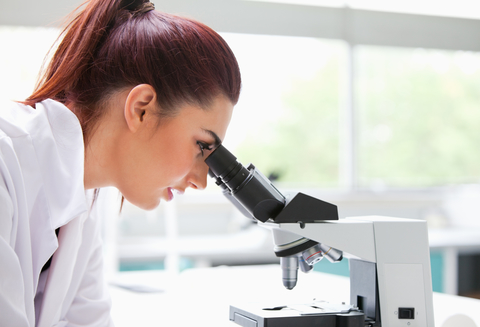New microscope can examine cancer cells in 3D

Cardiff University researchers have developed a groundbreaking new microscope which allows them to examine cancer cells in 3D.
WalesOnline has reported that Professor Trevor Dale and Professor Paola Borri claim the pioneering technology could lead to the discovery of new cancer treatments.
They were given a grant of nearly £400,000 by Cancer Research UK and Channel 4’s Stand Up To Cancer campaign to fund their three year research project.
Trevor Dale said “Most research examines cancer cells in 2D in the lab, where they grow flattened out on plastic dishes. This is far removed from their natural environments, which means there is only so much a scientist can learn by studying cells in this way. Our research is more advanced as we are using technology that allows us to grow cancer cells as 3D miniature tumours called organoids. These organoid structures more closely resemble a living tumour in a person and can help us better understand different people’s cancers and how drugs can be used to treat them.”
Trevor Dale and Paola Borri said it can be difficult to study organoids because not all microscopes are equipped to visualise these complex 3D structures. But they said their microscope, which they describe as “beyond state-of-the-art”, is able to manage it. Using a technique called CARS (Coherent Anti-Stokes Raman Scattering) and laser beams the pair can monitor the vibrations of molecules inside the cancer organoids to see how new treatments affect, or kill, them.
Paola Borri said “We use laser-light which will enable us to view a 3D organoid in a way which has never been done before. One important advantage of this method is that the sample remains virtually unaffected during imaging, meaning that the same organoid can be studied multiple times over different days, and crucially both before and after drug treatment.”
Trevor Dale added “We are excited that this project will help steer drug discovery and improve how we tailor treatments to the unique architecture of different cancers. Already, experimental drugs that were previously ineffective in 2D are starting to show promise in 3D. The research should eventually lead to faster identification of more effective drugs, potentially with fewer side effects for cancer patients.”
Launched in the UK in 2012, Stand Up To Cancer has already raised more than £38m to fund more than forty clinical trials and research projects.
Every day fifty two people are diagnosed with cancer in Wales.
Ruth Amies, Cancer Research spokesman for Wales, said “Stand Up To Cancer aims to accelerate the translation of brilliant scientific discoveries into innovative cancer tests and treatments. Here in Cardiff research is taking place that could change the face of cancer forever. We’re on the brink of a revolution in cancer research – thanks to improvements in treatments and early diagnosis, more people are surviving than ever before. But we can’t afford to stand still. It’s time to rebel against cancer, raise money and save lives. Every pound raised for Stand Up to Cancer will help to support this progress and bring forward the day when all cancers are cured.”
For more information and to get involved in Stand Up To Cancer visit standuptocancer.org.uk








